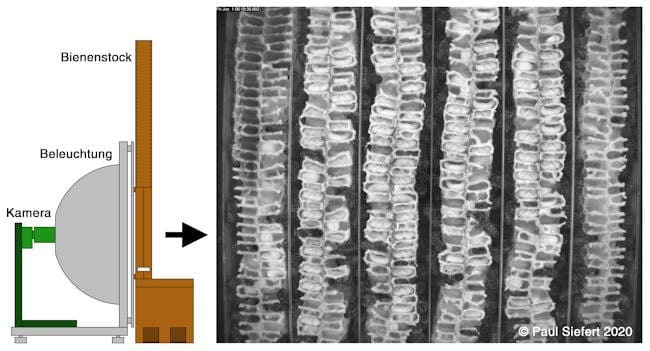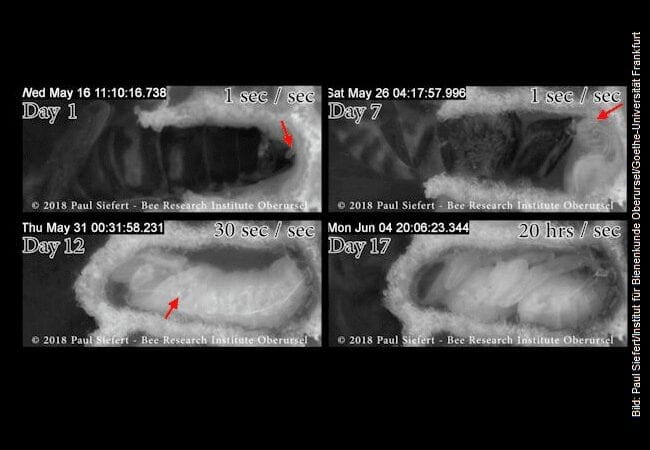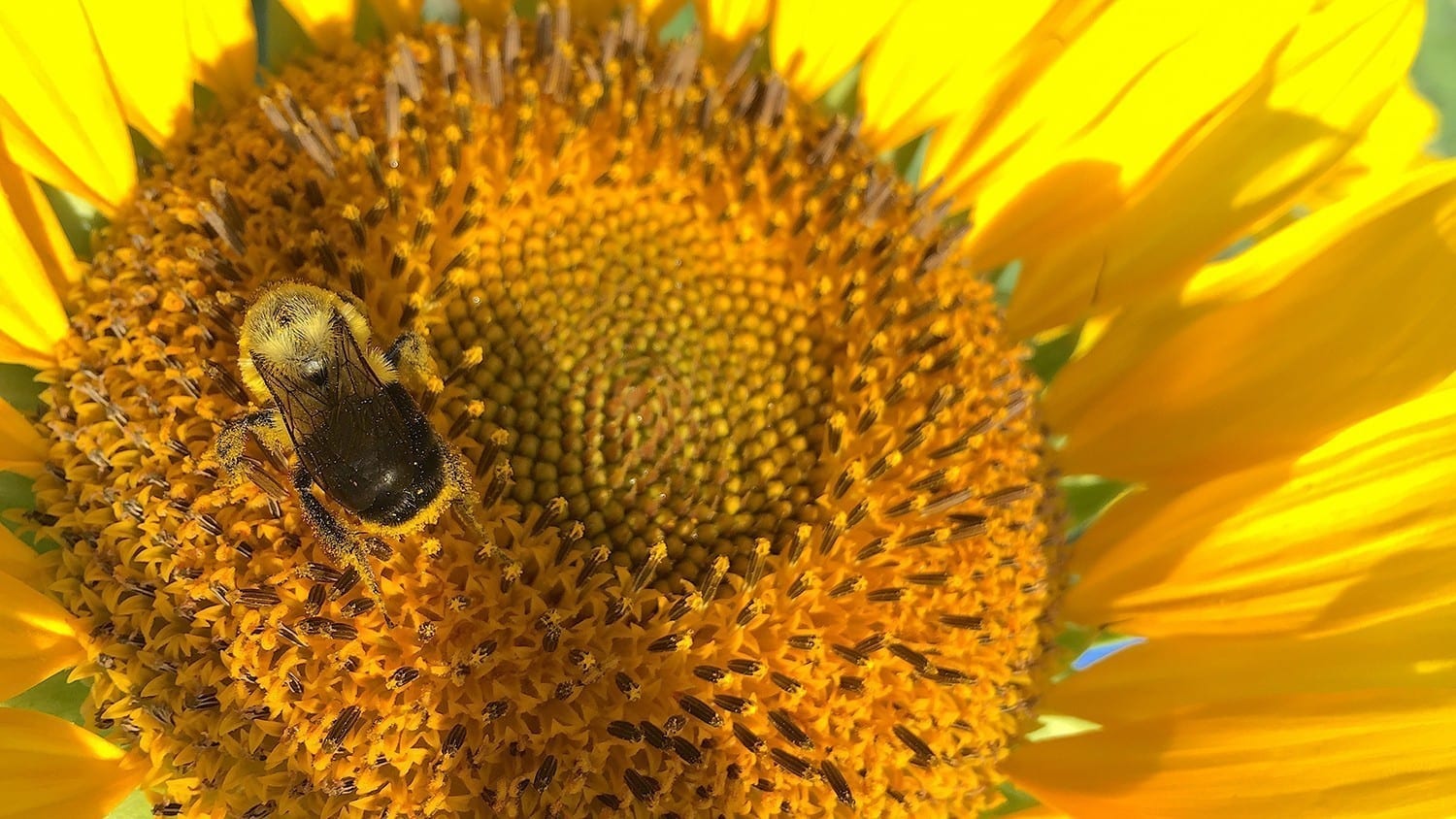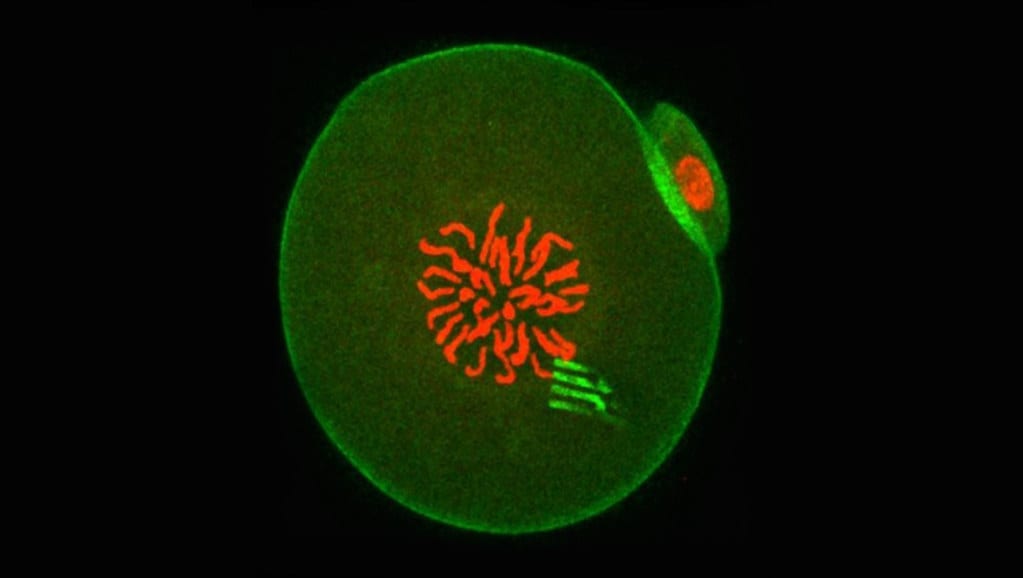
Diagram/monitoring of brood cells – side view of the construction and camera view of the brood area. The brood area of the bees was filmed with a camera (green) through a dome lighting (grey). The specially designed hive (brown) was only 2.4 cm wide, so that the bees would raise young as quickly as possible (right). Credit: Paul Siefert/Bee Research Institute Oberursel/Goethe University Frankfurt
A newly developed video technique has allowed scientists at Goethe University Frankfurt at the Bee Research Institute of the Polytechnical Society to record the complete development of a honey bee in its hive for the first time. It also led to the discovery that certain pesticides – neonicotinoids – changed the behaviour of the nurse bees: researchers determined that they fed the larvae less often. Larval development took up to 10 hours longer. A longer development period in the hive can foster infestation by parasites such as the Varroa mite.
Honey bees have very complex breeding behaviour: a cleaning bee cleans an empty comb (brood cell) of the remains of the previous brood before the queen bee lays an egg inside it. Once the bee larva has hatched, a nurse bee feeds it for six days. Then the nurse bees caps the brood cell with wax. The larva spins a cocoon and goes through metamorphosis, changing the shape of its body and developing a head, wings and legs. Three weeks after the egg was laid, the fully-grown bee hatches from the cocoon and leaves the brood cell.
Using a new video technique, scientists at Goethe University Frankfurt have now succeeded for the first time in recording the complete development of a honey bee in a bee colony at the Bee Research Institute of the Polytechnical Society. The researchers built a bee hive with a glass pane and were thus able to film a total of four bee colonies simultaneously over several weeks with a special camera set-up. They used deep red light so that the bees were not disturbed, and recorded all the movements of the bees in the brood cells.
The researchers were particularly interested in the nursing behaviour of the nurse bees, to whose food (a sugar syrup) they added small amounts of pesticides known as neonicotinoids. Neonicotinoids are highly effective insecticides that are frequently used in agriculture. In natural environments, neonicotinoids arrive in bee colonies through nectar and pollen collected by the bees. It is already known that these substances disturb the navigational abilities and learning behaviour of bees. In a measure criticised by the agricultural industry, the European Union has prohibited the use of some neonicotinoids in crop cultivation.
Using machine learning algorithms developed by the scientists together with colleagues at the Centre for Cognition and Computation at Goethe University, they were able to evaluate and quantify the nursing behaviour of the nurse bees semi-automatically. The result: even small doses of the neonicotinoids Thiacloprid or Clothianidin led to the nurse bees feeding the larva during the 6-day larval development less frequently, and consequently for a shorter daily period. Some of the bees nursed in this manner required up to 10 hours longer until the cell was capped with wax.

The Latest Updates from Bing News & Google News
Go deeper with Bing News on:
Honey bee
- COLLEGE SOFTBALL: Four Bees earn All-CCAC honors
Shai Erdrich, Muscatine’s Becca Haag and Alyssa Schumacher from the St. Ambrose softball team have been named first team All-Chicagoland Collegiate Athletic Conference and Emilee Erickson was selected ...
- Bees prove why they’re masters of teamwork in Lego experiment
Bumblebees have been observed playing with Lego - for science. Originally published on talker.news, part of the BLOX Digital Content Exchange.
- Scientists Taught Bees To Play With Legos, Then Marveled At What Happened
A new study involving Lego bricks finds that even small-brained bumblebees have the ability to understand the role of partnership in working together toward a common goal.
- Honey bees swarm driver on the streets of Bakersfield
College student Caleb Bailey came out of his Bakersfield College final exam to see a swarm of bees clumped to his driver side mirror. He believes the hive must ...
- Room to grow: city touts bees and pollinator plants
Tracie Bowers could talk for hours about pollinator plants. Bowers, who's been a master gardener since 2015, was one of the volunteers on hand Saturday for Sanford's inaugural Bee City USA Field Day.
Go deeper with Google Headlines on:
Honey bee
[google_news title=”” keyword=”honey bee” num_posts=”5″ blurb_length=”0″ show_thumb=”left”]
Go deeper with Bing News on:
Bees and pesticides
- Baby bumblebees are dying in their nests and climate change is to blame
A new study reveals rising temperatures are harming bumblebee populations by disrupting the ideal nest environment.
- Rising temperatures are cooking bumblebee nests and killing larvae
The global bumblebee population has declined since the 1950s, sparking speculation on the causes – researchers have suggested everything from pesticides to habitat loss. Because bumblebees are ...
- ‘For the bees’: Retiring U of M entomologist Marla Spivak reflects on long career of bee science, advocacy
A University of Minnesota professor who is a widely recognized researcher and advocate for bees is retiring after more than 30 years. Marla Spivak created the U of M Bee Squad and the Bee Lab, and was ...
- These stunning close-up photos offer a window onto the world of bees
FEW insects (or even animals) hold quite as much sway on the planet as bees. As pollinators that flock from flower to flower, crop to crop, they keep the world’s flora and biodiversity thriving. And ...
- What’s All The Buzz About Bees?
Pollinators like bees are an essential part of the food web but they are in sharp decline as urbanization and the widespread use of pesticides continues to ...
Go deeper with Google Headlines on:
Bees and pesticides
[google_news title=”” keyword=”bees and pesticides” num_posts=”5″ blurb_length=”0″ show_thumb=”left”]










